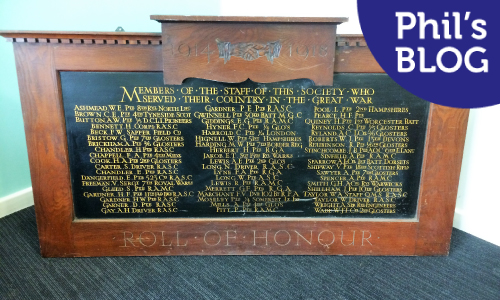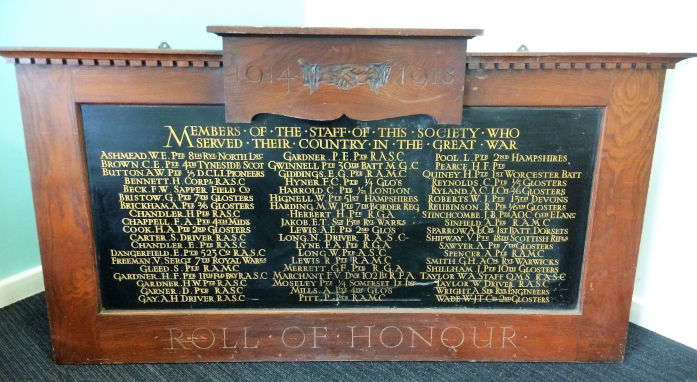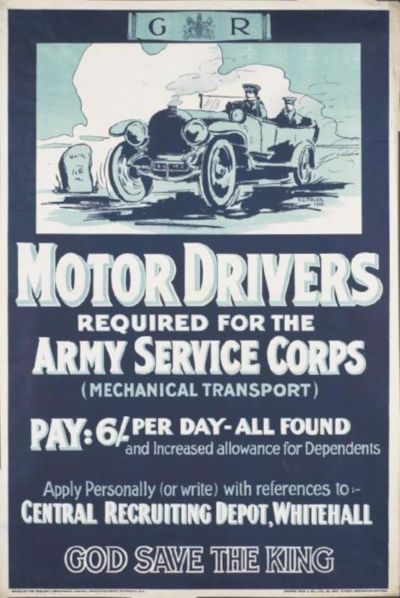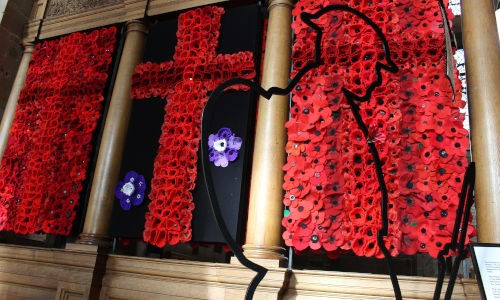In remembrance of co-operators in WW1

The centenary of the end of The First World War or The Great War commemorates the end of the bloodiest conflict in this country's history. So I am dedicating my whole blog this week to all those co-operators who fought and died during the First World War.
Roll of Honour
In the foyer at Co-operative House is a Roll of Honour with the names of 57 colleagues on it. The Roll of Honour lists all those who lost their lives during the Great War. The average age of those on the roll will be 19 or 20. Please take the time to look at the names when you are visiting Co-operative House.
The 57 names on the Roll of Honour aren’t just anonymous names but are colleagues like you and I who worked in our stores and offices. That is 57 colleagues who never saw their family again. 57 colleagues who never had the chance to have a family or watch their children grow up. 57 colleagues who didn’t grow old with their loved ones.

The area covered by the Roll of Honour does not equate to our current trading area but includes Gloucestershire, Worcestershire and Warwickshire. If you look at the entries on the memorial the first thing that strikes you is the number of different regiments or battalions they served in. Men generally served in their local regiment but if they had family connections to other parts of the country they often signed up with them. So as well as those joining close to home like the Gloster’s, Worcester and the Royal Warwickshire Regiments there are others listed from further afield including London, the Devon’s, North Lincolnshire and the Scottish Rifles.
Ranks and theatres of war
When it comes to rank most of the men commemorated were Privates (Pte - soldiers) or Sappers (Spr- engineers), the lowest ranking in the army. However, there were also Sergeants (Sergt, Sgt), Lance Corporals (LCpl), one Acting Corporal (ACpl) and one Corporal (Corpl) who would have been in charge of the men fighting at the front.
The men commemorated on the plaque served throughout the different theatres of war across the British Empire and the world. For example the Gloucestershire Regiment, commonly referred to as the Glosters, were made up of 16 battalions who saw active service in France, Italy, Egypt, Mesopotamia (today Iran, Iraq, Syria, Lebanon, Israel and Jordan) and Salonika (today the Balkans). The 12 men on our Roll of Honour were part of a total of 8,100 men killed from the regiment. Between them the regiment won 72 different battle honours including 4 awards of the Victoria Cross.
Drivers
Among the list of 57 I’d like to highlight 4 colleagues in particular
Carter. S.
Gay, A. H.
Long, N.
Taylor, W.
If you look on the Roll of Honour they were all drivers for the R.A.S.C. or the Royal Army Service Corps. The R.A.S.C. was responsible for supporting the troops at the front line including providing them with food, water, fuel and clothing. All would have been drivers for us before the war and would have been attracted to the role with posters like this, emphasising the high rate of pay of 6 shillings a day (in comparison a privates basic pay was 1-2 shillings a day).

The reality was far from the jaunt implied on the poster. It was a uniquely dangerous job as the men had to drive along potholed and muddy roads littered with unexploded shells often under heavy fire. They were an easy target for the German guns who picked them off as they approached the trenches. Consequently they had a very high casualty rate and uniquely among service staff they were considered to be front line combatants. As a result of their bravery the corps received the "Royal" prefix for its service after the war.
At the time of the Great War there were dozens of Societies operating across our trading area all of whom actively encouraged their colleagues to sign up despite the impact on the business. Unlike most employers all our Societies paid colleagues their full wages when they were on active service, minus government war contributions. At the start of the war Societies also paid three months wages to widows until the government legislated to support them.
You can find out more about other co-operators who fought in the First World War in a very good article by Anca Voinea in this month’s Coop News www.thenews.coop
Could you help find out more?
To find out more about our Roll of Honour I would like to offer any colleague who is interested the opportunity to research the individual’s men’s war records. This will require online research and a visit to the National Archives at Kew. We will then use this information to put together an interpretation board which we will put up next to the Roll of Honour.
If you would be interested in taking up this opportunity please email our Communications Team stating why you’d like to research the Roll of Honour.
What we are doing to commemorate Armistice Day?
To commemorate all those co-operators who served during the First World War Midcounties will be holding a number of events throughout our trading area in the run up to Sunday November 11th.
-
All our stores who are open will be honouring the two minute silence and have been selling Poppy’s since the start of the appeal.
-
Some of our funeral homes and food stores will be laying wreaths at their local war memorials
-
In co-operation with our partner schools we are running a ‘make a Poppy’ projects to be displayed in our stores. An overall winner will be selected who will win a prize of £500 towards history related activities for their school.
-
At Co-operative House on Friday 9 November we will be holding a dress down in aid of the Royal British Legion and a local school will be helping us scatter Poppy seeds. Pete Westall will also be laying a wreath on the Roll of Honour in the entrance.
-
A percentage of all our takings on the day will be donated to the Royal British Legion.

Published 9 Nov 2018 by Phil Ponsonby







